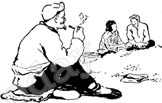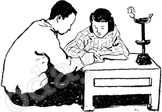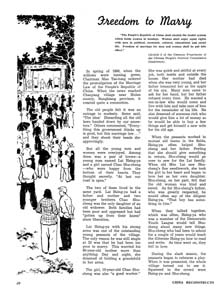
"The People's Republic of China shall abolish the feudal system which holds women in bondage. Women shall enjoy equal rights with men in political, economic, cultural, educational and social life. Freedom of marriage for men and women shall be put into effect."
(Article 6 of the Common Programme of the Chinese People's Political Consultative Conference).
In spring of 1950, when the willows were turning green, Chairman Mao Tse-tung ordered the promulgation of the Marriage Law of the People's Republic of China. When the news reached Chaoyang village near Hulan county, Sungkiang province, it created quite a commotion.
The old people felt it was an outrage to modesty. Some said, "The idea! Discarding all the old laws handed down by our ancestors." Others commented, "Everything this government thinks up is good, but this marriage law..." and they shook their heads disapprovingly.
But all the young men and women were overjoyed. Among them was a pair of lovers - a young man named Lai Hsing-ya and a girl named Chao Shu-cheng - who were happy from the bottom of their hearts. They thought secretly. "At last our road is open."
The two of them lived in the same yard. Lai Hsing-ya had a father and mother and two younger brothers. Chao Shu-cheng was the only daughter of an old widower. Both families had been poor and oppressed but had "gotten up from their knees" since liberation.
Lai Hsing-ya with his strong arms was one of the outstanding young peasants of the village. The only reason he was still single at 23 was that he had been too poor to marry. This worried his 60-year-old mother more than anything. Day and night, she dreamed of holding a grandchild in her arms.
The girl, 18-year-old Chao Shu-cheng was also "a good worker." She was quick and skilful at every job, both inside and outside the house. Her mother had died when she was very young, and her father treasured her as the apple of his eye. Many men came to ask for her hand, but her father refused every time. He wanted a son-in-law who would come and live with him and take care of him for the remainder of his life. He also dreamed of someone rich who would give him a lot of money so he would be able to buy a few things and get himself a new wife for his old age.
When the peasants worked in mutual aid teams in the fields, Hsing-ya often helped Shu-cheng and her father. Feeling that she should give something in return, Shu-cheng would go over to sew for the Lai family. When old Mrs. Lai saw Shu-cheng's fine needlework, she took the girl to her heart and began to love her as her own daughter. Shu-cheng, on her part, felt that the old woman was kind and sweet. As for Shu-cheng's father, who was greatly respected, he would often say of the diligent Hsing-ya. "That boy has something to him."
When they talked together, which was often, Hsing-ya who was a member of the Democratic Youth League would tell Shu-cheng about many new things. Shu-cheng who had been to school for a couple of years would teach the illiterate Hsing-ya how to read and write. As time went on, they fell in love.
During the slack season, the peasants began to rehearse a play. When it was presented, the whole village turned out to see it. Squeezed in the crowd were Hsing-ya and Shu-cheng.
The play was called "Yang Hsiao-lin." It was about a peasant boy who loved a peasant girl named Yang Hsiao-lin, and how they overcame all sorts of feudal obstacles in their fight for freedom of choice in marriage. As the play went on, Hsing-ya and Shu-cheng got more and more excited. Hsing-ya felt that "Yang Hsiao-lin" in the play was just like Chao Shu-cheng. As for Shu-cheng, she saw a strong resemblance between the hero of the play and the sweetheart of her choice. On their way home, Hsing-ya plucked up courage and stammered to Shu-cheng, "Let's be like 'Yang Hsiao-lin'." Blushing furiously, Shu-cheng nodded assent.
It did not take long for the whole village to see through Hsing-ya and Shu-cheng's "secret." Tongues began to wag. All the young people said enviously, "They are making a free choice." Admiringly they commented, "They are opening the road for us, good for them!"
But people who were less open-minded said, "How shocking! It seems that people will do anything, so long as the law allows." Some even said, "It's because Shu-cheng had no mother to teach her manners."
When the talk was carried to the ears of Shu-cheng's father, he was simply furious. He felt that his daughter had brought shame on his house. Although he had known that Shu-cheng and Hsing-ya saw each other very often, he had thought to himself, "They're only working together. There's no harm in that." Also he had been afraid of saying anything lest he offend Hsing-ya, in which case there would be nobody to help with the heavy work.
Old Chao first wanted to give his daughter a good scolding, but on second thought he changed his mind. He reasoned: "The child has not had the care of a mother. She has worked like a boy, and hasn't had a chance to enjoy herself." So he ended by trying to dissuade Shu-cheng gently with: "Hsing-ya is a good boy. But his family is too poor. You will have a hard time if you marry him."

"He is a fine boy, but he is too poor."
To his surprise, his daughter didn't take kindly to his well-meant advice. She actually dared retort: "Hsing-ya may be poor now, but he's not going to be poor all his life. I like him because he's hard working, and I am ready to share any hardships with him. Besides the government believes that men and women should be allowed to choose their own lifelong partners. Parents should not interfere."
Old Chao's eyes nearly popped out of his head. He ordered his daughter never to enter his house again. But Shu-cheng remained firm in her decision.
At Hsing-ya and Shu-cheng's request, the village leaders went to have a talk with old man Chao. They pointed out how many traditional buy-and-sell marriages had ended tragically. They quoted paragraphs from the marriage law. Finally they said, "Freedom of choice in marriage is our national law. No one is allowed to go against it." The old man still dissented in his heart but had nothing more to say.
The bumper harvest of 1950 was something that had not been seen in over a dozen years. Every family in the village rejoiced, especially the Lai family, which had a wedding to celebrate as well. But they banged no drums and cymbals, and killed no pigs or sheep, as was the custom. All that happened was this. At sunset, Shu-cheng and Hsing-ya put on new clothes, and came back from the marriage registration office, smiles all over their faces. Afterward, there was a simple wedding ceremony. As was the old custom, the village leaders and young people went into the newlyweds' bedroom, teased them and made them tell the story of their love. The sound of their laughter greatly irritated old man Chao who lived next door. Sighing and snorting, he drank one glass of wine after another.
All eyes in the village were glued on the Lai family after this "strange" wedding ceremony. What everybody saw was that the very next day after the wedding, the bride and bridegroom went out to work on the harvest. The young couple showed even more zest than before in work and study. The Lais lived in harmony. The news spread to the villages around. Other young people followed Shu-cheng and Hsing-ya's example, choosing their own partners.
The old people were astonished. For her wedding, Shu-cheng had not conformed to any of the old superstitions. She had not stopped to consider whether the day was lucky for weddings. The young couple had not bowed to heaven and earth for blessings. Still their married life seemed perfect. Said old Mrs. Lai, "This 'freedom of choice' is really a good thing. The ceremony is simple and economical, and we old folks don't have to fuss over anything."
Old man Chao stayed angry for some time. But he was gradually brought around by the behaviour of the Lai family. None of its members turned a cold shoulder on him for having tried to stop the marriage. On the contrary, they treated him even more kindly, and the young couple often came to see him and tell him the news. Besides, there was no more sarcastic gossip around the village. Instead, some of the former gossips were heard to say: "Those young people did the right thing."

Giving him a reading: lesson.


 Copy Reference
Copy Reference 